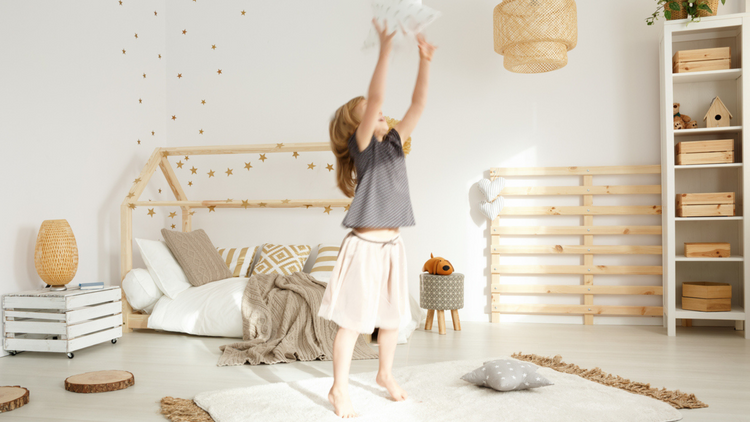As parents, we often go to great lengths to ensure our children are engaged, stimulated, and well-occupied throughout the day. While playdates, extracurricular activities, and family outings are undoubtedly valuable, it's equally important to recognize the significance of independent time in your child's room. At Giggles and Dozes, we believe that a child's bedroom is more than just a place to sleep; it's a haven for growth, creativity, and self-discovery. Let's explore the importance of independent time for children in their room and how it contributes to their overall development.
1. Fosters Creativity and Imagination:
Independent time in their room encourages children to tap into their creativity and imagination. It provides a quiet space where they can explore new ideas, invent stories, and engage in imaginative play. This unstructured time allows them to be the architects of their own adventures.
2. Develops Problem-Solving Skills:
When children have the freedom to play and explore independently, they encounter situations that require problem-solving. Whether it's building a fort, creating a new game, or figuring out how to organize their toys, these experiences nurture their critical thinking and decision-making abilities.
3. Builds Self-Confidence:
Independent time offers children opportunities to make choices and take ownership of their activities. As they set goals, accomplish tasks, and see the results of their efforts, their self-confidence and self-esteem grow. This sense of achievement is invaluable for their overall development.
4. Encourages Self-Expression:
Children need a space where they can express themselves freely without judgment. Independent time in their room allows them to explore their interests, hobbies, and emotions through play, art, or simply quiet reflection.
5. Enhances Focus and Concentration:
In a world filled with distractions, learning to focus and concentrate is a valuable skill. Spending time alone in their room without constant external stimulation can help children develop these essential skills, which will benefit them academically and in various life pursuits.

6. Promotes Emotional Regulation:
Being alone in their room provides a safe space for children to manage their emotions. They can retreat to their room when they need to calm down, process feelings, or simply recharge. It's a crucial aspect of emotional regulation and self-awareness.
7. Teaches Time Management:
Independent time allows children to practice managing their time. They learn to allocate time for various activities, prioritize tasks, and make efficient use of their resources, all of which are valuable life skills.
8. Fosters a Sense of Ownership:
A child's room is often a space they can call their own. Allowing them independent time in their room fosters a sense of ownership and responsibility for their space. They learn to care for and organize their belongings, creating a sense of pride and ownership.
9. Supports Academic Readiness:
Independent play can also have a positive impact on a child's academic readiness. Activities such as reading, drawing, and experimenting with educational toys in their room can enhance their cognitive development and prepare them for learning.
10. Nurtures Relaxation and Self-Care:
Lastly, independent time allows children to unwind and practice self-care. It's an opportunity to engage in quiet activities like reading a book, taking a nap, or listening to music, which can help them recharge and maintain a healthy balance between activity and relaxation.
At Giggles and Dozes, we understand the value of a child's personal space. Our collection of quality children's beds is designed to create an inviting environment where independent time can flourish. By providing a comfortable and imaginative space, you can empower your child to explore, learn, and grow independently within the safety and comfort of their own room.
As parents, nurturing independent time in your child's room is a gift that keeps on giving. It not only supports their growth and development but also fosters a lifelong love for creativity, exploration, and self-discovery.

